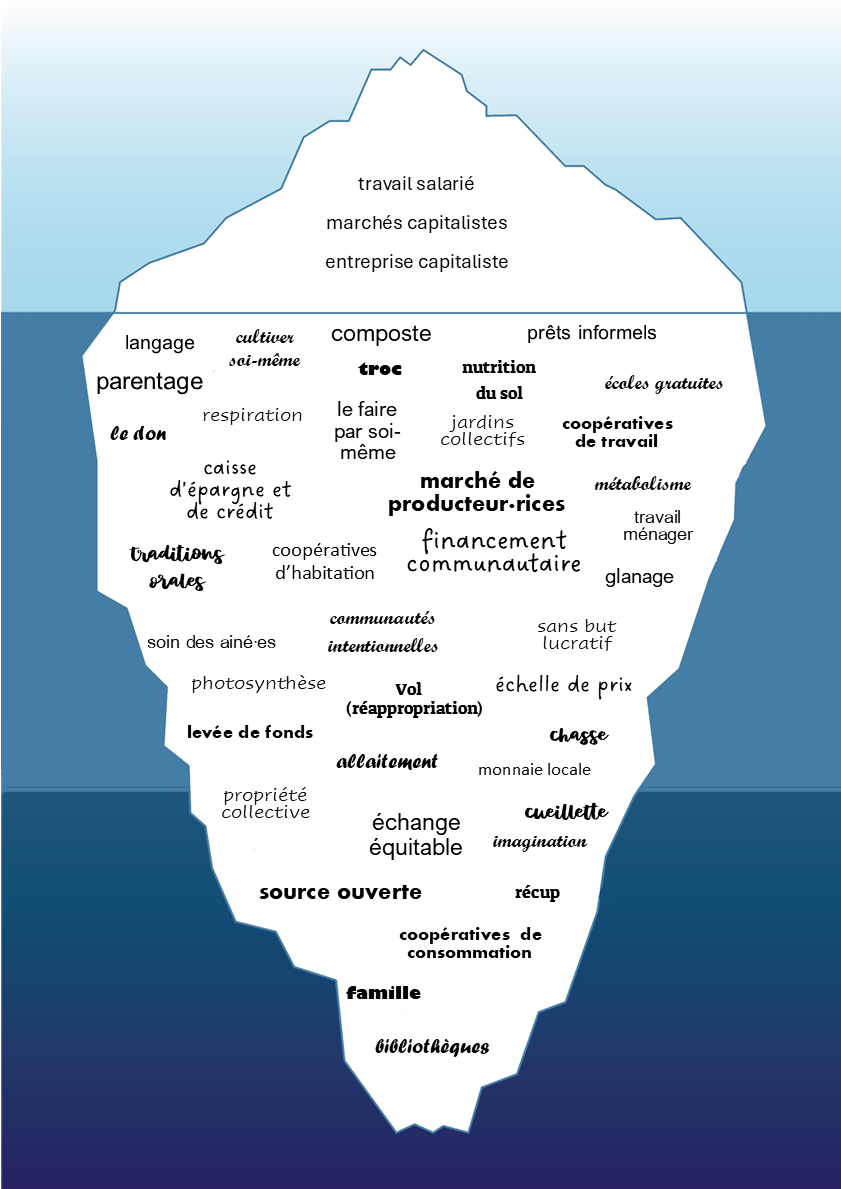SCPA 301/AA (Fall/Winter 2024-25): SOC DEBS & ISSUES IN PA&POL
- Teacher: CHEDLY BELKHODJA
- Teaching Assistant: Hana Sherafati Zanganeh
SCPA 203/A (Winter 2025): COM&PUB AFF IN QUE&CAN
- Teacher: ROSA PIRES

Community Organizing 101
This course focuses on understanding power, context and agency, engaging in critical social analysis and developing practical skills required in community organizing. The course explores popular education in community mobilization and collective action, and prepares students to run a successful strategic campaign, including identifying and analyzing targets, tactics, allies and potential opponents.
This course is designed to give students the opportunity to deepen their knowledge of social transformation strategies, and above all to equip themselves to apply them. Focusing on practice and popular education, the pedagogical approach enables students not only to acquire knowledge and skills, but also to equip themselves to pass them on to others in the field. A dynamic, interactive learning environment is created using the flipped classroom. This pedagogical model allows maximum classroom time to be devoted to exercises, discussions and projects.
Objectives:
« Discuss the oppositional approach to community organizing
« Explain power, interests, and balance of struggle
« Analyze a strategic campaign to obtain a demand based on an analysis of power dynamics
« Discuss popular education pedagogy
« Use the basic elements of Socratic dialogue to better understand the course material and practice sharing conversational space in a group.
- Teacher: ANNA KRUZYNSKI
- Non-editing teacher: ALICIA CUNDELL
- Teaching Assistant: MICHELLE DUCHESNEAU
SCPA 412/A (Winter 2025): SENIOR RESEARCH SEMINAR
- Teacher: PETER GRAHAM

SCPA 450/A (Winter 2025):
The aim of this course is to explore the increasing reach of neoliberalism as a global ecological phenomenon. Neoliberalism is defined as the privatization of the public sphere, deregulation of the private sector, lowering of income and corporate taxes, the insertion of barriers for labour organizing, and induced scarcity in spending for public services (Naomi Klein, 2014). Global capitalism has come to reflect the hegemony of the Washington Consensus - a set of 10 economic policy prescriptions promoting free-market policies, including trade liberalization and fiscal and monetary reform among others. It also reflects a “There is No Alternative” (TINA) framing, squashing the possibility of alternative social systems and alternative worldmaking visions. As an all-pervasive modus operandi of human interaction with each other and with the living Earth, capitalism is an ecological system of its own. Through showcasing the premise of global(ized) capitalism and its regional flavours, the course will also touch on the response of collective movements for social justice, responding to the social and environmental fallout of a world order that precludes the possibility of alternatives. We will explore global justice movements in the areas of migration, labour, climate, access to land, and food policy, among others. Finally, this course will link the fallout of global capitalism to the rise of far-right populist movements that are both a consequence of globalized neoliberalism and aim to impose an authoritarian neoliberalism that silences dissent and opposition to the TINA frame.
- Teacher: VIJAY KOLINJIVADI
SCPA 480/AA (Winter 2025): PUBLIC AFFAIRS & COMMUNICATION
- Teacher: GRACIA JALEA
SCPA 481/A (Winter 2025): SETTLEMENT AND INTEGRATION
- Teacher: ROSA PIRES
SCPA 498/A (Winter 2025): SPEC TOPICS COM STDS,PA& POL
- Teacher: CHEDLY BELKHODJA
SCPA 505/GA (Winter 2025): COLLECT ENTERPRISE/ENTREPRISES
- Teacher: SHANNON FRANSSEN
SCPA 507/GA (Winter 2025): PARCIP MGMT/GESTION PARTICIPIT
- Teacher: ALLISON DEER
SCPA 510/GA (Winter 2025): FLD PROJ & MENTORSHP/PROJET SU
- Teacher: ELSA BEAULIEU BASTIEN
This course examines the historical, political, and social dimensions of immigration policies in Quebec and Canada. It explores the evolution of immigration policy from pre-Confederation to contemporary times, highlighting the interplay of national and provincial interests, especially Quebec’s unique approach to immigration. The course addresses critical issues such as multiculturalism and integration models, the role public opinion in shaping immigration policies, and growing contemporary concerns over the capacity of Canada and Quebec to integrate newcomers, encouraging students to analyze the impacts of immigration on Canadian society.
- Teacher: SIMON-PIERRE LACASSE
- Teaching Assistant: Murad Sharaf
SCPA 298/GA (Summer 2025)
- Teacher: KAREN L HERLAND
- Teaching Assistant: Lacey Boudreau

This course focuses on understanding power, context and agency, engaging in critical social analysis and developing practical skills required in community organizing. It explores popular education in community mobilization and collective action, and prepares students to run a successful strategic campaign, including identifying and analyzing targets, tactics, allies and potential opponents.
This course is designed to give students the opportunity to deepen their knowledge of social transformation strategies, and above all to equip themselves to apply them. Focusing on practice and popular education, the pedagogical approach enables students not only to acquire knowledge and skills, but also to equip themselves to pass them on to others in the field. A dynamic, interactive learning environment is created using the flipped classroom. This pedagogical model allows maximum classroom time to be devoted to exercises, discussions and projects
- Teacher: ANNA KRUZYNSKI
- Teaching Assistant: MICHELLE DUCHESNEAU
SCPA 508/GA (Summer 2025): FIN CED INITIATIVES/FINANCEMEN
- Teacher: COLIN BERUBE
SCPA 536/GA (Summer 2025): INDIG. CED/DEC EN MILIEU AUTOC
- Teacher: DAVID NEWHOUSE
SCPA 543/GA (Summer 2025): SPEC TOP CED/THEMES CIBLES CED
- Teacher: SHANNON FRANSSEN
SCPA 201/A (Fall 2025): PUBLIC POLICY &INTEREST
- Teacher: Aaron Vansintjan
SCPA 212/A (Fall 2025): INTRO/GLOBAL MIGRATION
- Teacher: CHEDLY BELKHODJA
SCPA 215/A (Fall 2025): ECON FOR PUB POL&COM DEV
- Teacher: PETER GRAHAM

Social Debates and Issues in Public Affairs and Public Policy
- Teacher: ANNA SHEFTEL
- Teaching Assistant: SKYE MIECHKOTA
SCPA 321/A (Fall 2025): PUBLIC AFFAIRS STRATEGIES
- Teacher: THEODORA SAMIOTIS
SCPA 498/A (Fall 2025): SPEC TOPICS COM STDS,PA& POL
- Teacher: CHEDLY BELKHODJA

Beyond capitalism for a better world
This course focuses on helping students acquire theoretical and practical skills to accompany communities in their efforts to reframe and enact the economy as a diversity of interdependent practices. This includes learning how to create better livelihoods for people and the planet by engaging in ethical praxis with respect to labour, enterprise/organisation, transactions, property and finance. Students explore initiatives from around the world, with a focus on emancipatory practices such as reorganizing work to improve wellbeing, involving workers in decisions about distribution of surplus, engaging in ethical transactions, maintaining and replenishing natural and cultural commons and investing in the livelihoods of future generations.
- Teacher: ANNA KRUZYNSKI
- Non-editing teacher: VIJAY KOLINJIVADI
- Teaching Assistant: MICHELLE DUCHESNEAU